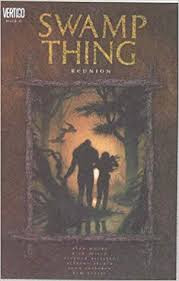See Fictional Languages.
When writing Swamp Thing: Reunion (New York, 2003), pp. 10-48, Alan Moore obviously:
wrote dialogue in English;
invented a word in a fictional, extraterrestrial language corresponding to each of the English words that he had used;
rewrote the dialogue, using these invented words;
incorporated this rewritten dialogue into a comic strip script without presenting any translation back into English.
We read several pages of apparent gibberish, then decipher some, though not all, of it with the help of context and repetition. I will give examples in an ensuing post.

4 comments:
The problem with casually inventing a language is that it tends to resemble your own, only with different words. Eg., a lot of English monoglots don't realize how unusual the analytic structure of modern English is -- it's actually more like Chinese in some ways than its own ancestors.
(English is an extreme outlier among Germanic languages. Or Indo-European ones in general, in fact.)
Kaor, Mr. Stirling!
Ann English is very much a MONGREL language, casually absoring any and all words from any language, with complete and total indifference to the "purity" of the language.
Ad astra! Sean
Alan Moore's experiment is interesting but suffers from the point that Mr Stirling makes.
The AENEID begins "Arma virumque cano," "I sing of arms and a man," literally: "Arms manand sing I."
Irish: "Ta madra agam," "I have a dog," literally: "Is dog atme."
Post a Comment